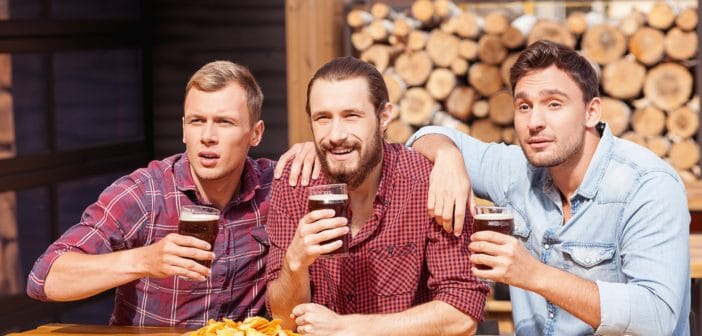 When I stopped drinking, I felt like I stopped being a man. I firmly and sincerely believed that. I’d suddenly abandoned a fundamental part of manhood. I’m not a “guy’s guy” who’s steeped in ESPN, motorcycles, UFC, or Maxim, but in my first months of sobriety, I heard a very clear voice cutting through all the static: Men are supposed to drink. You’re weak. You’re a failure.
When I stopped drinking, I felt like I stopped being a man. I firmly and sincerely believed that. I’d suddenly abandoned a fundamental part of manhood. I’m not a “guy’s guy” who’s steeped in ESPN, motorcycles, UFC, or Maxim, but in my first months of sobriety, I heard a very clear voice cutting through all the static: Men are supposed to drink. You’re weak. You’re a failure.
I wasn’t ever going to be a sober man. That’s not who I was. I was the guy ordering another round of shots for everyone as soon we finished the first one. As much as I loved being a Goodtime Charlie, I absolutely hated being a drag on the ticket. I dreaded telling people—especially my male friends—that I was sober. I was so terrified of telling my buddies that I practiced excuses in front of a mirror, almost to convince myself: I’m on antibiotics. I’m driving later. I have a stomach bug. I feared seeing a light dim in their eyes—flickers of disappointment, of pity, of farewell.
It still doesn’t compute with a lot of my male friends. “You can’t, like, ever drink again?” “What happens if you just have one?” “This is a Michelob Ultra, man. You can practically hydrate with this.” Certainly, in their eyes, I should be able to handle one 12-ounce can of light beer. I used to agree with them. I’ve always been taken with the hard-drinking protagonists in novels and movies—all of them fueled by whiskey and riding into the night full of resolve. Seeing Clint Eastwood gun down a bunch of outlaws before sauntering up to the bar? He earned that shot of whiskey. That’s how I felt about my drinking: I was entitled to it because I was a man, goddammit. It was part of our chromosomal makeup to hold our liquor. That’s why there’s nothing endearing about a dude staggering on the way home the bar, puking into a snowdrift. No woman is ever five paces behind him, thinking: Maybe there’s still a chance he’ll sleep with me. It’s always the other way around.
I don’t want to know how many nights I’ve spent with the bar slowly kaleidoscoping away from me as I tried to keep up with others. “Trying to keep up” yielded me a DUI, broken relationships, job losses, financial problems and more slurry-brained mornings than I knew what to do with. What I’ve come to realize is that no one expected anything of me or my drinking. I was the loneliest pace car hurtling around an empty track. Still, at my velocity, most normal people would’ve simply quit drinking. Instead, I simply trained harder. I was committed to awakening whatever drinking talent laid dormant in my cells. “Being a man” would magically kick in and I could handle what I was putting in my body. I was convinced if I just found the right alchemy of beer, red wine and Jagermeister, I’d get it right. Hell, if I could harness it, maybe I’d level up and unlock a superpower. After all, none of my drinking buddies seemed to have a problem. They could drink like men and wake up the next day, just fine.
Truth be told, countless women have drunk me under the table, too. I can’t tell you how many shots of Cuervo I’ve tossed back as a pissed-off reaction to some girl challenging my masculinity, only to regret the decision every single time. I didn’t even like tequila, but I hated the idea of being someone’s trophy even more. A lot of women I knew prided themselves on being “one of the boys,” knocking back drink after drink, wiping their chins with their sleeves. Women who held their liquor were rare creatures to me. If I found one, I felt like I should immediately put her behind glass in a Ripley’s Believe It or Not! Museum, like a cat who can bark. With every woman who could drink, I felt a challenge rise inside me. I had to prove I was a man. And still, I never understood why I was constantly losing a competitive sport I was programmed to win. If I couldn’t keep up with the ladies, something was wrong with me. I’ve chased that ghost down—that specter of certainty that I would eventually triumph, win the night’s drinking, and steal back that drinking crown.
In the end, I was a bobble head with an encyclopedic knowledge of movie release dates, five-syllable words and whatever else could get someone’s attention. I drank because I felt like I had to. Alcohol is how I asserted myself, it’s how I played my role, and it’s how I protected my pride as a man. If they made action figures of drinkers (or should I say inaction figures), mine would come with accessories like Bottle and Sarcasm. It’s laughable now to think I believed being a better man meant being hunched over a shot glass with shaky hands.
I still feel a sour pang whenever I see Instagrammed martinis or raised glasses of cabernet against a fireplace on Facebook. But it’s fleeting—a quick stab of sadness like when you see postcards from an exotic locale you’ll never visit. I realize now that it’s all stylized, like food porn. I’m not less of a man for not being able to knock back a beer while I’m grilling outside with neighbors on a hot summer day. Now I find strength in my vulnerability, much like how bones grow stronger in the places they’ve broken. A lot of that strength happens on its own, too. Most of my drinking buddies have quietly fallen out of orbit with me. Happy hours have turned into nods and occasional text messages. But I’ve grown stronger in those places—I’ve found self-confidence, ambition, and determination.
Drinking hasn’t ever been a competition about my manhood—it’s been a struggle with who I am as a person. Now, it’s more rewarding and somehow more life-affirming to tell people I don’t drink. I don’t fear it anymore. What I’ve learned in sobriety is that being a man, drinking or not, is about standing for something. I have to own why I’m sober. I’m not letting anyone else down by not drinking—I’m letting people down if I do. I can’t feed the imagined two-second glimmer of sadness I think I’m seeing in someone else’s eyes when I turn down their chardonnay. Asking for help is the bravest thing I can do as a sober guy. I guess I’ve decided to finally stop at the side of the road and, against every instinct, ask for directions. I’m not aimlessly wandering the countryside in circles, just because that’s what men do. I’m allowing others to guide me and, for the first time in my life, I think I’m actually going somewhere.
Sponsored DISCLAIMER: This is a paid advertisement for California Behavioral Health, LLC, a CA licensed substance abuse treatment provider and not a service provided by The Fix. Calls to this number are answered by CBH, free and without obligation to the consumer. No one who answers the call receives a fee based upon the consumer’s choice to enter treatment. For additional info on other treatment providers and options visit www.samhsa.gov.




